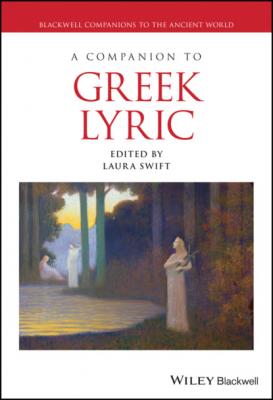A Companion to Greek Lyric. Группа авторов
Чтение книги онлайн.
Читать онлайн книгу A Companion to Greek Lyric - Группа авторов страница 27
 the narrator asks Kypris in a spirit of desperate resignation “What do you have in mind to torture me thus idly with such uncertainty?” (v. difficult text) [ποῖ]ον ἔχησθα / [νῶν] σ̣άλοισι̣ μ, ἀλεμά̣τ̣ω̣ς̣ δ̣αί̣σ̣δ̣[ην].
the narrator asks Kypris in a spirit of desperate resignation “What do you have in mind to torture me thus idly with such uncertainty?” (v. difficult text) [ποῖ]ον ἔχησθα / [νῶν] σ̣άλοισι̣ μ, ἀλεμά̣τ̣ω̣ς̣ δ̣αί̣σ̣δ̣[ην].48 48 Boychenko 2017. The remark is based on Menander Rhetor’s comment “most [sc. hymns] by Sappho or Anacreon or other melic poets tend to be cletic, as they contain an appeal to many gods to come.”
49 49 See esp. the chapter “Gebet und Götterhymnus” in Tsomis 2001: 38–96.
50 50 The expression ἀφοσιοῦσθαι θεῶι implies “satisfy one’s conscience towards the gods.”
51 51 On the transmission of the Theognidea, see Bowie (Chapter 21 ) in this volume.
52 52 1–10 W in honor of Apollo, 11–14 W to Artemis, 15–18 W the Muses.
53 53 Simonides fr. 11 W (P.Oxy. 2327 fr. 5 + 6 + 27 col. i + 3965 fr. 1 + 2). Cf. Boedeker 1995.
54 54 According to West’s plausible supplements.
55 55 As Pausanias (3.4.7–8) says explicitly when he is discussing Leonidas’ glory in the Persian Wars: “It is only in a few (cases) where the virtue of one man alone has magnified that of many, as Achilles did in the Trojan War.”
56 56 Hall 1989.
57 57 Walker 2015, esp. ch. 5.
58 58 P.Oxy. 4708. Obbink 2006; and see West 2006. At least one more heroic work of this nature seems to have been Archilochus’ “Hymn to Herakles,” which was allegedly sung at Olympia for victors; cf. Eratosthenes (FGrH 241 F 44) who quotes an opening “Greetings lord Heracles, glorious in victory.” Pòrtulas 2012 suggests that the myth may have been about Herakles’ fight with Poseidon, Apollo, and Hades, as mentioned by Pindar Ol. 9.30–35. Note also his discussion of a new cult song introduced by Archilochus in Paros, as documented in the Mnesiepes Inscription. He taught the song (διδάξαντα) and organized its performance by “companions” (ἑταῖροι).
59 59 Cf. West 2006: 15.
60 60 2–3 [εἰ δὲ].[….].[].ι θεοῦ κρατερῆς ὑπ, ἀνάγκης, / [οὐ δεῖ ἀν]αλ̣[κείη]ν̣ κ̣αὶ κακότητα λέγει[ν].
61 61 7–8 [ἐ]ς̣ τόσα̣ δὴ μοῖρα θεῶν ἐ̣φόβε̣ι̣ -- / αἰχμητ̣α̣ί περ̣ ἐόντε[ς].
62 62 The epithet ἐρατήν, lovely, is perhaps not religious per se, but the attribute “of Teuthras” firmly locates it in the heroic sphere.
63 63 Cf. West loc. cit., who cites as parallel Adesp. iamb. 38.5–11, another case of sensible flight. We hear of another poem by Archilochus on the heroic myth of Herakles, this time in connection with the fateful crossing of the River Acheloos: frr. 286–288 W.
64 64 I don’t quite understand Swift’s point (2014) that there is a conflicting message in the paradigm: both the fleeing Greeks and Telephos are said to be brave: the point is, even the brave Greeks fled before a rampant Telephos.
65 65 Cf. Pseudo-Plutarch, On Music 1131b10-c1 ἀλλὰ καθάπερ <τὴν> Στησιχόρου τε καὶ τῶν ἀρχαίων μελοποιῶν, οἳ ποιοῦντες ἔπη τούτοις μέλη περιετίθεσαν· “but like the <diction> of Stesichorus and the archaic melic poets, who composed epic verses in melic [metres].” Later the author of this work says that Stesichorus imitated none other than Olympos, a legendary pupil of Marsyas, employing τῶι Ἁρματείωι νόμωι καὶ τῶι κατὰ δάκτυλον εἴδει (1133f3–6), “the Harmateion nome and dactylic meter.”
66 66 Parsons 1978.
67 67 On the identity of Oedipus’ wife and other questions of interpretation, see Hutchinson 2001: 120–139; Davies and Finglass 2014, ad loc.
68 68 The well-known mythical theme as dramatized by Aeschylus, for example, in Seven against Thebes.
69 69 Pseudo-Longinus De sublimitate 13.3.1, calls him (and Archilochus) Ὁμηρικώτατος, “most Homeric.”
70 70 The main edition and commentary is by Rutherford 2001.
71 71 van der Weiden 1991; Zimmermann 1992.
72 72 New edition by Prodi 2014.
73 73 The main edition of Pindar’s cult poetry is the Teubner by Snell and Maehler (see S-M in list of abbreviations). Cf. Pavlou 2011.
74 74 Nagy 1990a.
75 75 Tony Harrison’s play Trackers of Oxyrhynchus contains a portrait of the pair, as they unearth and decipher papyri.
76 76 Cf. Rutherford loc. cit.; Dougherty 1994; also considered by Carey 2017.
77 77 The cult details tie in with local socio-demographic structures in a way inviting analysis according to Kowalzig’s method.
78 78 3–5 σέθ]εν Ἰάονι τόνδε λαῶι / παι]ᾶνα [δι]ώξω / Δηρηνὸν Ἀπόλλωνα πάρ τ, Ἀφρο[δίταν].
79 79 The poem is in Doric dialect!
80 80 Carey 2017 considers the question of the identity of singer and audience more carefully.
81 81 28–30 νεόπολίς εἰμι· ματρὸς / δὲ ματέρ, ἐμᾶς ἔτεκον ἔμπαν / πολεμίωι πυρὶ πλαγεῖσαν.
82 82 I find the metaphor “I have given birth,” ἔτεκον, odd if applied to the young men of the chorus, more natural if applied to personified Abdera. Unfortunately there is no specific indication of gender in the whole run from 24 to 36.
83 83 Known as παιανίζειν.
84 84 Note lines 102–103 ἐμο̣[ὶ δ, ἐπ]έ̣[ω]ν ἐσ[.] / …ε]ὐκλέα [……]ν χά[ρ]ιν, in which Pindar seems to be talking of the “fame of words” which is due him.
85 85 As Käppel 1992 says.
86 86 Ἄβδ]ηρε, καὶ στ[ρατὸν] ἱ̣ππ̣οχάρμαν / σᾷ] β̣ί̣ᾳ πολέ[μ]ωι τελευ‐ / ταί]ωι προβι[β]άζοις, “Abderus, may you advance your cavalry, too, with your force in a final war.”
87 87 Wilamowitz-Moellendorff 1907 (=1995): 55.
88 88 Cf. Liapis 2017.
89 89 One ancient reference to this common saying in Aristophanes Clouds 566Σ: ἔθος τοῖς ποιηταῖς τὴν ἁρχὴν